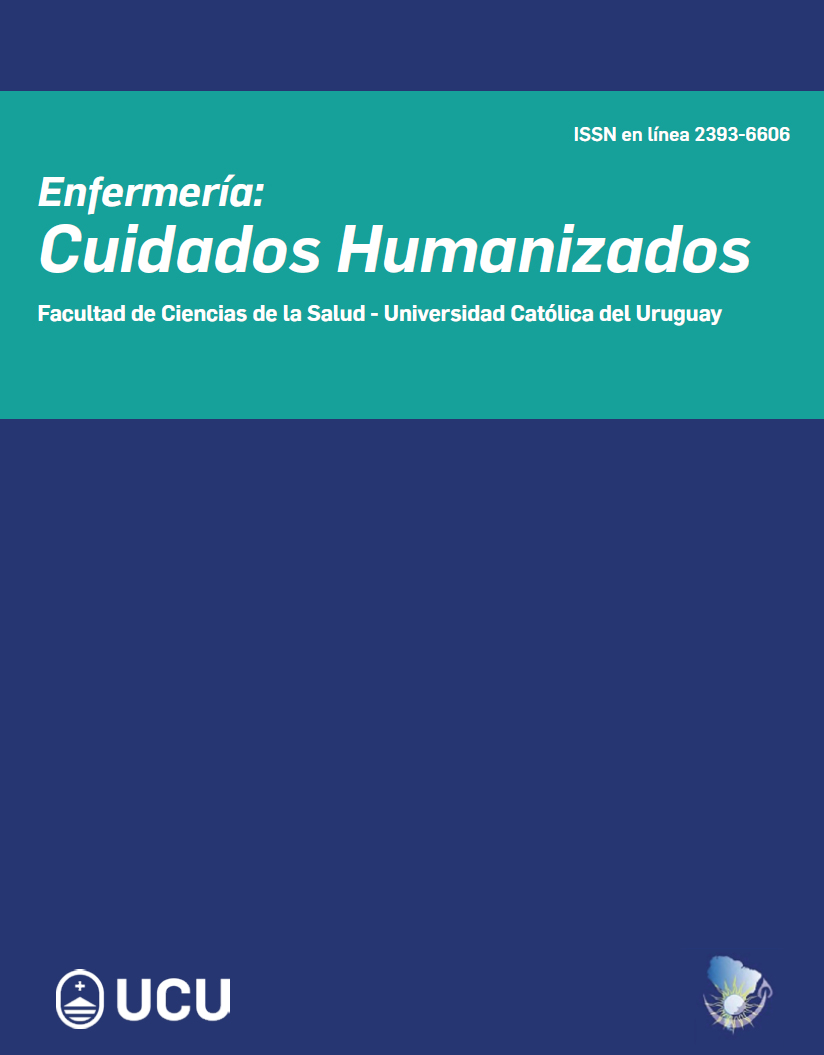Atitudes diante da morte em profissionais de enfermagem latino-americanos: uma revisão integrativa
DOI:
https://doi.org/10.22235/ech.v13i2.3772Palavras-chave:
atitude, morte, enfermagem, cuidados de enfermagem, teoria de enfermagemResumo
Introdução: A morte faz parte dos tabus sociais existentes e pode fomentar atitudes que se distanciam de sua abordagem explícita em relação aos cuidados. Objetivo: analisar as atitudes diante da morte em profissionais de enfermagem de acordo com as publicações científicas no contexto latino-americano no período de 2018 a 2022. Metodologia: Foi realizada uma revisão de literatura integrativa de publicações científicas latino-americanas sobre atitudes diante da morte no contexto da enfermagem, utilizando os seguintes termos padronizados: atitude, morte, enfermagem e cuidados de enfermagem. Foram incluídos 8 artigos publicados no período definido, em espanhol e português, nos quais o tema da revisão foi abordado explicitamente. As informações dos artigos foram analisadas tendo como referência os conceitos da teoria das transições. Resultados: Foram identificados desenhos quantitativos (50 %) e qualitativos (50 %), elaborados totalmente no âmbito hospitalar. Os principais resultados mostram a predominância da indiferença diante da morte no contexto do cuidado. Em relação à teoria das transições, a maioria dos artigos aborda as condições em que as transições ocorrem, além dos conceitos de terapêutica de enfermagem e padrões de resposta. Conclusões: A produção de pesquisas sobre atitudes diante da morte em profissionais de enfermagem é escassa na América Latina. As experiências de perdas próximas, a capacitação e o apoio institucional são a base para contribuir para uma melhor atitude em relação à morte.
Downloads
Referências
Mazzetti C. Entre el humor y el tabú. La muerte en la trama comunicacional. Perspectivas de la Comunicación [Internet]. 2021;14(2):95-125. doi: 10.4067/s0718-48672021000200095
Heleonora C, Bastos S, Dutra G, Alende L. A Enfermagem Diante Da Morte: Uma Revisão Narrativa De Literatura. Revista Recien [Internet]. 2022;12(39):148-160. doi: 10.24276/rrecien2022.12.39.148-160
Peters L, Cant R, Payne S, O’Connor M, McDermott F, Hood K, et al. How Death Anxiety Impacts Nurses’ Caring for Patients at the End of Life: A Review of Literature. Open Nurs J. 2013;7:14-21. doi: 10.2174/1874434601307010014
Strang S, Bergh I, Ek K, Hammarlund K, Prahl C, Westin L, et al. Swedish nursing students’ reasoning about emotionally demanding issues in caring for dying patients. Int J Palliat Nurs. 2014;20(4):194-200. doi: 10.12968/ijpn.2014.20.4.194
Conrey F, Smith E. Attitudes representation: Attitudes as patterns in a distributed, connectionist representational system. Social Cognition. 2007;25(5):718-735. doi: 10.1521/soco.2007.25.5.718
Maldonado C. Death and Complexity. Rev. latinoam. bioet [Internet]. 2021;21(1):113-126. doi: 10.18359/rlbi.5376
Quinaglia E. Ideario de la muerte en occidente: la bioética en una perspectiva antropológica crítica. Rev. Bioét. 2019;27(1):38-45. doi: 10.1590/1983-80422019271284
Manual del proceso manejar y entregar cadáveres y piezas anatómicas [Internet]. San Salvador: Subdirección de Salud; 2022. Disponible en: https://www.transparencia.gob.sv/institutions/isss/documents/481891/download
Manejo seguro de cadáveres. Guía para equipos de salud [Internet]. Buenos Aires: Ministerio de Salud de la Nación; 2011. Disponible en: https://bancos.salud.gob.ar/sites/default/files/2018-10/0000000097cnt-manejo_cadaveres.pdf
Norma técnica hospitalaria para manipulación de cadáveres [Internet]. Ciudad de Guatemala: Ministerio de Salud Pública y Asistencia Social; 2013. Disponible en: https://pdf.usaid.gov/pdf_docs/PA00JM5Z.pdf
Orientación Técnica Cuidados Paliativas Universales [Internet]. Chile: Ministerio de Salud; 2022. Disponible en: https://www.minsal.cl/wp-content/uploads/2023/07/Orientacion-Tecnica-Cuidados-Paliativos-Universales.pdf
Death cafe guide [Internet]. Londres: Impermanence; 2012. [citado 2020 abr 8]. Disponible en: https://deathcafe.com/how/
Enfermería y partería [Internet]. Organización Panamericana de la Salud; [citado 2023 sep 5]. Disponible en: https://www.paho.org/es/temas/enfermeria
Amancio A, Camarena E, Fajardo M, Del Carpio S. Comunicación terapéutica del profesional de enfermería y donación de órganos. Apuntes Universitarios [Internet]. 2021;11(3):13-28. doi: 10.17162/au.v11i3.690
Melgarejo G, Rivas L, Loli R. Conceptualización y percepción de enfermería sobre el cuidado del niño. Rev Cubana Enferm [Internet]. 2022;38(2):1-16. Disponible en: https://revenfermeria.sld.cu/index.php/enf/article/view/5088
Im Eun-Ok. Teoría de las transiciones. En: Modelos y Teorías en Enfermería. 7ª ed. Barcelona: Elsevier Mosby; 2011, p. 416-433.
Lizarondo L, Stern C, Carrier J, Godfrey C, Rieger K, Salmond S, et al. Mixed methods systematic reviews. En Aromataris E, Munn Z, editors. JBI Manual for Evidence Synthesis. JBI; 2020. doi: 10.46658/JBIMES-20-09
Page MJ, McKenzie JE, Bossuyt PM, Boutron I, Hoffmann TC, Mulrow CD, et al. The PRISMA 2020 statement: an updated guideline for reporting systematic reviews. BMJ 2021;372:n71. doi:10.1136/bmj.n71
von Elm E, Altman DG, Egger M, Pocock SJ, Gøtzsche PC, Vandenbroucke JP, et al. The Strengthening the Reporting of Observational Studies in Epidemiology (STROBE) statement: guidelines for reporting observational studies. Lancet. 2007 Oct 20;370(9596):1453-1457. doi: 10.1016/S0140-6736(07)61602-X. PMID: 18064739.
Cano Arana A, González Gil T, Cabello López JB. Plantilla para ayudarte a entender un estudio cualitativo. En CASPe. Guías CASPe de Lectura Crítica de la Literatura Médica. Alicante: CASPe; 2010, p. 3-8. Disponible en: https://redcaspe.org/plantilla_cualitativa.pdf
López M, Vega P, Carrasco P, González X, Abarca E, Rojo L, et al. Estrategias del equipo de salud para afrontar la muerte de niños y adolescentes con cáncer. Rev Cubana Enfer [Internet]. 2022;38(2): e4624. Disponible en: https://pesquisa.bvsalud.org/portal/resource/pt/biblio-1408335
Morales F, Ramírez F, Cruz A, Arriaga R, Vicente M, De la Cruz C, et al. Actitudes del personal de enfermería ante la muerte de sus pacientes. Rev Cuid [Internet]. 2021;12(1):1-10. doi: 10.15649/cuidarte.1081
Osés M, Casas J, Seguel F. Actitudes hacia la muerte de profesionales de Enfermería de España y Chile. Metas Enferm [Internet]. 2020;23(10):58-64. doi: 10.35667/MetasEnf.2020.23.1003081675
Trevisan D, Rosa J, Colomé C. Percepções dos profissionais da saúde sobre a morte de pacientes. Revista Subjetividades [Internet]. 2020;20(1):1-13. doi: 10.5020/23590777.rs.v20i1.e9164
Cáceres D, Cristancho L, López L. Actitudes de las enfermeras frente a la muerte de los pacientes en una unidad de cuidados intensivos. Ciencias De La Salud [Internet]. 2019;17(3):98-110. doi: 10.12804/revistas.urosario.edu.co/revsalud/a.8368
Ospina-Garzón H, Henao-Castaño A, Rivera-Romero N. Significado de brindar cuidado al paciente crítico al final de la vida en Unidad de Cuidados Intensivos. Index Enferm [Internet]. 2019;28(1-2):42-45. Disponible en: http://scielo.isciii.es/scielo.php?script=sci_arttext&pid=S1132-12962019000100009&lng=es
García-Avendaño D, Ochoa-Estrada M, Briceño-Rodríguez I. Actitud del personal de enfermería ante la muerte de la persona en la unidad de cuidados intensivos: estudio cuantitativo. Duazary [Internet]. 2018;15(3):281-893. doi: 10.21676/2389783X.2421
Machado ML, Viero M, Devos EL, Tomaschewski JG, Pereira L, Guimarães A. Diretivas antecipadas de vontade: Percepção acerca da aplicabilidade no contexto neonatal e pediátrico. Revista de Enfermagem da UFSM [Internet]. 2018;8(3):475-488. doi: 10.5902/2179769227887
Mercadal-Sánchez J, Ferrer Romero E, Fradejas-García I, Sánchez Larrosa AI. Enfermos sin compañía, muertos sin funeral: acompañamiento paliativo en centros sociosanitarios de Barcelona durante la COVID-19. RIO [Internet]. 2023;(30):79-103. doi: 10.17345/rio30.79-103
Yepes-Delgado C, Vanegas-Díaz C, Mesa-Muñoz C, Estrada-Bedoya G. Miedo a la muerte y a su proceso en personal de pediatría durante la pandemia COVID-19. Salud UIS [Internet] 2023;55: e:23037. doi: 10.18273/saluduis.55.e:23037
Cardoso MFPT, Martins MMFPS, Ribeiro OMPL, Pereira VLSC, Pires RMF, Santos MR. Nursing managers’ attitudes towards death: repercussions of the COVID-19 pandemic. J Health NPEPS. 2020;5(2):42-59. doi: 10.30681/252610104960
Martins A. El final de la vida en la perspectiva de la salud global. Concilium. 2021;(393): 69-80.
Sancho Gómez M. Morir con dignidad. Madrid: Arán Ediciones; 2005.
Pavez A. La enfermería, realidad de ciudadanía y de género en Chile. Cienc. Enferm. [Internet]. 2013;19(3):95-102. doi: 10.4067/S0717-95532013000300010
Zenevicz LT, Bitencourt, JVOV, Léo MMF, Madureira VSF, Thofehrn MB, Conceição VM. Permissão de partida: um cuidado espiritual de enfermagem na finitude humana. Rev Bras Enferm [Internet]. 2020;73(3):1-5. doi: 10.1590/0034-7167-2018-0622
Sevilla-Casado M, Ferré-Grau C. Ansiedad ante la muerte en enfermeras de Atención Sociosanitaria: datos y significados. Gerokomos [Internet]. 2013;24(3):109-114. doi: 10.4321/S1134-928X2013000300003
Pais N, Batista C, Marques A, Moreira I. Effectiveness of a training program for nurses’ emotional management of patient death. Revista de Enfermagem Referência [Internet]. 2020;(3):1-7. doi: 10.12707/RV20023
Palomar M, Romero M, Pérez E, Romero M. Educar para la vida y la muerte a los estudiantes de Enfermería: “del miedo al amor”. Enfermería: Cuidados Humanizados [Internet]. 2020;9(1):65-81. doi: 10.22235/ech.v9i1.2167
Violim N, Trevisan J, Quina M, Perfeito R, Oliveira A, Lourenço M. Satisfacción, fatiga por compasión y factores asociados en las enfermeras de la atención primaria. Enferm. glob. [Internet]. 2021;20(64):291-323. doi: 10.6018/eglobal.457511
Pintado S. Programas basados en mindfulness para el tratamiento de la fatiga por compasión en personal sanitario: una revisión. Ter Psicol [Internet]. 2018;36(2):71-80. doi: 10.4067/S0718-48082018000200071
Rivas E, editor. La historia de la Enfermería en Chile. Santiago de Chile: Ediciones Universidad de la Frontera; 2019.
Publicado
Como Citar
Edição
Secção
Licença
Direitos de Autor (c) 2024 Enfermería: Cuidados Humanizados

Este trabalho encontra-se publicado com a Licença Internacional Creative Commons Atribuição 4.0.

















